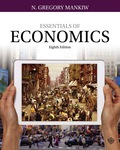
EBK ESSENTIALS OF ECONOMICS
8th Edition
ISBN: 8220103599832
Author: Mankiw
Publisher: Cengage Learning US
expand_more
expand_more
format_list_bulleted
Question
Chapter 9, Problem 5CQQ
To determine
The policy which hurts consumers and helps producers and increases trade.
Expert Solution & Answer
Want to see the full answer?
Check out a sample textbook solution
Students have asked these similar questions
what is defecit in economy?
what is economic?
and whatis the different between microeconomic and economic?
Where can I go to get my own wax supplies?
Chapter 9 Solutions
EBK ESSENTIALS OF ECONOMICS
Knowledge Booster
Similar questions
- Problem 2. If the consumer preference can be represented by a CES function with δ = 0.5, i.e. u(x, y) = x0.5 + y0.5. Let the prices and income be (px, py, w). 1. Set up the Lagrangian expression.2. Take the first-order conditions.3. Substitute into budget constraint to derive the optimal consumption bundles.arrow_forward1. A town relies on four different sources for its non-drinking water needs: dam water, reclaimed water, rain water, and desalinated water. The different sources carry different risks and costs. For instance, desalinated water is fully reliable due to abundant sea water, but it is more expensive than other options. Reclaimed water also has relatively lower risk than rain or dam water since a certain amount can be obtained, even during the dry. season, by the treatment of daily generated waste water. Using any of the four options requires an investment in that resource. The return on a particular water source is defined as the amount of water generated by the source per dollar of investment in it. The expected returns and standard deviations of those returns for the four water sources are described in the following table: Water resource Expected return St. Deviation Dam water 2.7481 0.2732 Reclaimed water 1.6005 0.0330 Rain water 0.5477 0.2865 Desalinated water 0.3277 0.0000 Higher…arrow_forward1. Imagine a society that produces military goods and consumer goods, which we'll call "guns" and "butter." a. Draw a production possibilities frontier for guns and butter. Using the concept of opportunity cost, explain why it most likely has a bowed-out shape. b. Show a point that is impossible for the economy to achieve. Show a point that is feasible but inefficient. c. Imagine that the society has two political parties, called the Hawks (who want a strong military) and the Doves (who want a smaller military). Show a point on your production possibilities frontier that the Hawks might choose and a point the Doves might choose. d. Imagine that an aggressive neighboring country reduces the size of its military. As a result, both the Hawks and the Doves reduce their desired production of guns by the same amount. Which party would get the bigger "peace dividend," measured by the increase in butter production? Explain.arrow_forward
- A health study tracked a group of persons for five years. At the beginning of the study, 20%were classified as heavy smokers, 30% as light smokers, and 50% as nonsmokers. Resultsof the study showed that light smokers were twice as likely as nonsmokers to die duringthe five-year study, but only half as likely as heavy smokers.A randomly selected participant from the study died during the five-year period. Calculatethe probability that the participant was a heavy smokerarrow_forwardConsider two assets with the following returns: State Prob. of state R₁ R2 1 23 13 25% 5% 2 -10% 1% Compute the optimal portfolio for an investor having a Bernoulli utility of net returns u(r) = 2√√r+ 10. Compute the certainty equivalent of the optimal portfolio. Do the results change if short-selling is not allowed? If so, how?arrow_forwardIn the graph at the right, the average variable cost is curve ☐. The average total cost is curve marginal cost is curve The C Cost per Unit ($) Per Unit Costs A 0 Output Quantity Barrow_forward
- What are some of the question s that I can ask my economic teacher?arrow_forwardAnswer question 2 only.arrow_forward1. A pension fund manager is considering three mutual funds. The first is a stock fund, the second is a long-term government and corporate fund, and the third is a (riskless) T-bill money market fund that yields a rate of 8%. The probability distributions of the risky funds have the following characteristics: Standard Deviation (%) Expected return (%) Stock fund (Rs) 20 30 Bond fund (RB) 12 15 The correlation between the fund returns is .10.arrow_forward
- Frederick Jones operates a sole proprietorship business in Trinidad and Tobago. His gross annual revenue in 2023 was $2,000,000. He wants to register for VAT, but he is unsure of what VAT entails, the requirements for registration and what he needs to do to ensure that he is fully compliant with VAT regulations. Make reference to the Vat Act of Trinidad and Tobago and explain to Mr. Jones what VAT entails, the requirements for registration and the requirements to be fully compliant with VAT regulations.arrow_forwardCan you show me the answers for parts a and b? Thanks.arrow_forwardWhat are the answers for parts a and b? Thanksarrow_forward
arrow_back_ios
SEE MORE QUESTIONS
arrow_forward_ios
Recommended textbooks for you
 Economics (MindTap Course List)EconomicsISBN:9781337617383Author:Roger A. ArnoldPublisher:Cengage Learning
Economics (MindTap Course List)EconomicsISBN:9781337617383Author:Roger A. ArnoldPublisher:Cengage Learning

 Economics Today and Tomorrow, Student EditionEconomicsISBN:9780078747663Author:McGraw-HillPublisher:Glencoe/McGraw-Hill School Pub Co
Economics Today and Tomorrow, Student EditionEconomicsISBN:9780078747663Author:McGraw-HillPublisher:Glencoe/McGraw-Hill School Pub Co


Economics (MindTap Course List)
Economics
ISBN:9781337617383
Author:Roger A. Arnold
Publisher:Cengage Learning



Economics Today and Tomorrow, Student Edition
Economics
ISBN:9780078747663
Author:McGraw-Hill
Publisher:Glencoe/McGraw-Hill School Pub Co

